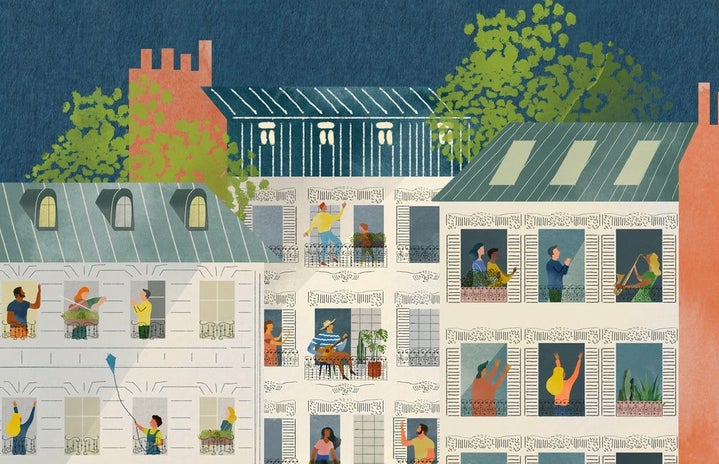Deciding to go to university in 2020 was like signing a contract to have somebody punch me in the nose every five seconds and agreeing to hand them a tenner for the privilege between each blow. As the year group consistently hung out to dry by pilot education schemes (new GCSEs, linear A-Levels in England, algorithm-assigned grades, the list goes on and on), it’s probably unsurprising that the universe would outdo itself and have us navigate university during a pandemic. There is something particularly unpleasant about self-isolating in student accommodation, when you are a legal adult being treated like some kind of leprous schoolchild. In this article, I intend to outline some of the silliest and most irritating roadblocks I’ve encountered during this process.

After dragging home a food shop stuffed into my overnight bag that I hoped would last me the next fortnight (spoiler: it didn’t), my flatmates and I checked in with each other. Here we encountered a second roadblock. It was Friday. Nobody answers department emails on Friday. And so two days of uncertainty passed, particularly for those of us, like myself, who are lucky enough to have some on-campus teaching scheduled for this term. Come Monday, little progress had been made. One flatmate was even told that her chances of being temporarily switched to an online class were limited due to ‘lack of notice’ (as if Covid-19 operates on a 9 to 5 basis).
This next slew of problems came in the form of our accommodation and the terms of our isolation itself. Contradicting NHS guidelines, our accommodation insists we all self-isolate for fourteen days, rather than ten. As we are all relatively on top of the news, we sat tight and waited for further instruction or communication on how we could access a way to do our laundry, or, quite pertinently, how we were supposed to obtain food. Dear reader, please bear in mind that our initial notification email was effective immediately. It’s not as if we could have taken time to prepare for the full duration of our sentence: done our laundry, made sure we had an adequate supply of underwear, done a leisurely and thorough food shop, ensured we had ample stock of medications and other essentials, and so on. As I am sitting in my room writing this article, on day eight of my isolation period, my flatmates and I have received no correspondence from our accommodation to check if we’re, you know, still breathing, let alone provide the option to pay for an extortionate care package such as those offered by the University of East Anglia (1). For the record, I don’t want to be extorted, but the option would have been nice!
Perhaps the most ridiculous roadblock encountered throughout this whole affair was the issue of actually getting tested for Covid. I began exhibiting symptoms some days after isolating and swiftly ordered a test to confirm or dissuade my suspicions. It got to the door of my room no problem, presumably brought up by a member of staff. Here was where the problems began. I called reception and asked what I should do now, after choking on and snorting the evil little white cotton-bud thing and packing it up safely. I could not leave the building to post the test myself; leaving the flat calls for threat of expulsion if I am caught (violating your terms of self-isolation is considered serious non-academic misconduct), so likewise could not bring it downstairs myself. My boyfriend and friends offered to post my test for me, but as they are not residents in my halls, they were not allowed to enter to pick it up. I had to rely on the mercy of strangers, who weren’t exactly leaping at the chance to help me out.
“We can come get your test,” a member of reception staff told me cautiously over the phone, “but we can’t post it. Sorry love – we’re understaffed.”
Ah. Okay then.
“Why don’t you get a friend from a different flat to bring it down for you?”
Because I do not have friends in different flats. Our accommodation’s own policy says that we are not supposed to mingle with other flats, which constitute households.
“What about another flatmate?”
Again, policy dictates that one flatmate showing symptoms means all of us must self-isolate. So that was impossible too.
*audible shrug*
So, I gave up and booked a courier. I warned staff in advance that I had booked a courier. I gave the time period that the courier was likely to arrive in. I left the completed test outside of my flat door as not to expose staff to our den of plague. I called again the following day to remind them that the courier was coming.
Four hours after that phone call, I am awoken from a feverish nap by the courier himself, calling to let me know he is five minutes away. Because I’m a terrible pessimist, I checked to see if my test was still languishing on the carpet outside of my flat door. Unsurprisingly, it was. So, the palaver of trying to get my test down four flights of stairs without actually being able to do it myself resumed again before eventually achieving success.
To conclude, I will be forever grateful to my friends, family and flatmates for keeping me sane throughout all the uncertainty. My flatmates and I were strangers to each other just a month ago, yet we are now a close unit (it’s funny how depending on each other for survival tends to do that). It is evident that the amount of support offered to self-isolating students varies dramatically from university to university, and even from accommodation to accommodation. However, this is precisely the problem. With such variation in the support available, it places an uncomfortable spotlight on the institutions that simply aren’t doing enough. Whilst trying to switch to online learning, it similarly became clear that there was no centralised process for dealing with self-isolating students. Although this was eventually sorted, albeit haphazardly, the process of moving from in-person to online classes was drawn out, stressful and unclear. This was unbelievably frustrating and really makes you wonder how prepared King’s was for blended learning when it opened its doors to students in September. I understand that my experience self-isolating does not represent that of every other student in this less than ideal situation. I understand that I am exceptionally privileged to have a roof over my head and access to a bathroom and kitchen. I also understand that this is an entirely new situation for everybody and that will take some time to smooth out kinks in self-isolation procedures. However, after having spent the months before and after the start of term ensuring students – investing a lot of money – that universities were ready to receive them, a month into term, I am struggling to maintain my patience. I hope that a more efficient and consistent policy is adopted – and soon, or universities risk thousands of students making the decision to study from home next term.
(Written on the 25th of October)



